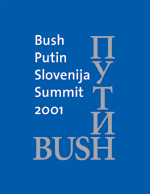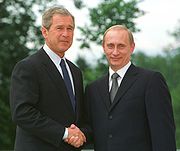
Bush-Putin 2001
Encyclopedia

George W. Bush
George Walker Bush is an American politician who served as the 43rd President of the United States, from 2001 to 2009. Before that, he was the 46th Governor of Texas, having served from 1995 to 2000....
and the Russia
Russia
Russia or , officially known as both Russia and the Russian Federation , is a country in northern Eurasia. It is a federal semi-presidential republic, comprising 83 federal subjects...
n President Vladimir Putin
Vladimir Putin
Vladimir Vladimirovich Putin served as the second President of the Russian Federation and is the current Prime Minister of Russia, as well as chairman of United Russia and Chairman of the Council of Ministers of the Union of Russia and Belarus. He became acting President on 31 December 1999, when...
. It took place on June 16th 2001 on the Brdo pri Kranju
Brdo pri Kranju
Brdo near Kranj is an estate and a mansion in the Slovenian region of Upper Carniola in the municipality of Kranj north of Ljubljana. It is the Slovenian Government's main venue for diplomatic meetings and other Government-sponsored events....
estate in northern Slovenia
Slovenia
Slovenia , officially the Republic of Slovenia , is a country in Central and Southeastern Europe touching the Alps and bordering the Mediterranean. Slovenia borders Italy to the west, Croatia to the south and east, Hungary to the northeast, and Austria to the north, and also has a small portion of...
. It was hosted by the then Prime Minister of Slovenia
Prime Minister of Slovenia
There have been six Prime Ministers of Slovenia since that country gained its independence in the breakup of Yugoslavia. Unlike the President of Slovenia, who is directly elected, the Prime Minister is appointed by the National Assembly, and must control a majority there in order to...
Janez Drnovšek
Janez Drnovšek
Janez Drnovšek was a Slovenian liberal politician, President of the Presidency of Yugoslavia , Prime Minister of Slovenia and President of Slovenia . He was born in Celje, Slovenia, then the Socialist Republic of Slovenia...
and by the President of Slovenia
President of Slovenia
The function of President of the Republic of Slovenia was established on 23 December 1991, when the National Assembly of Slovenia passed a new constitution as a result of independence from Socialist Federal Republic of Yugoslavia....
Milan Kučan
Milan Kucan
Milan Kučan is a Slovenian politician and statesman. He was the first President of Slovenia.-Early life and political beginnings:...
.
They were meant to discuss a wide range of political issues and establish a diplomatic case for future cooperation and negotiations. This was also Bush's first official trip to Europe
Europe
Europe is, by convention, one of the world's seven continents. Comprising the westernmost peninsula of Eurasia, Europe is generally 'divided' from Asia to its east by the watershed divides of the Ural and Caucasus Mountains, the Ural River, the Caspian and Black Seas, and the waterways connecting...
as U.S. President.
Before Bush and Putin met privately, each met with Prime Minister Janez Drnovšek and President Milan Kučan. The Slovenes' talks with Putin focused on the situation in South Eastern Europe, particularly in Macedonia. Kučan familiarized Putin with the agreement reached Friday in Skopje
Skopje
Skopje is the capital and largest city of the Republic of Macedonia with about a third of the total population. It is the country's political, cultural, economic, and academic centre...
to begin a dialog on constitutional adjustments.
Speaking with Bush, Drnovšek and Kučan focused on NATO expansion and partnership among Europe, the US and Russia. Unfortunately, Bush did not go so far as to offer an invitation for membership in NATO as many suspected. He simply reiterated the stance he had taken earlier in his trip, that he supports NATO expansion and is sure that at the summit next year in Prague
Prague
Prague is the capital and largest city of the Czech Republic. Situated in the north-west of the country on the Vltava river, the city is home to about 1.3 million people, while its metropolitan area is estimated to have a population of over 2.3 million...
new members will be invited.
After the meetings, Reuters
Reuters
Reuters is a news agency headquartered in New York City. Until 2008 the Reuters news agency formed part of a British independent company, Reuters Group plc, which was also a provider of financial market data...
quoted Bush as saying "I would urge people looking for a good vacation spot to come here." The American president was apparently quite impressed with Drnovšek, Kučan and Slovenia itself, and publicly thanked Drnovšek 'for his hospitality in this spectacular, beautiful country.'"
The summit was judged a success by both sides even though it left Russia and the US little closer to resolving the issues that divided them. The atmosphere was one of friendly co-operation with the two leaders getting on far better than expected. The warmth of the meeting surprised many. The first handshake looked stiff and awkward, but after well over an hour of talks they came out smiling with Bush inviting the Russian leader to visit his ranch
Ranch
A ranch is an area of landscape, including various structures, given primarily to the practice of ranching, the practice of raising grazing livestock such as cattle or sheep for meat or wool. The word most often applies to livestock-raising operations in the western United States and Canada, though...
in Texas
Texas
Texas is the second largest U.S. state by both area and population, and the largest state by area in the contiguous United States.The name, based on the Caddo word "Tejas" meaning "friends" or "allies", was applied by the Spanish to the Caddo themselves and to the region of their settlement in...
.
Bush described their meeting as straightforward and effective. He said it was time to move beyond Cold War
Cold War
The Cold War was the continuing state from roughly 1946 to 1991 of political conflict, military tension, proxy wars, and economic competition between the Communist World—primarily the Soviet Union and its satellite states and allies—and the powers of the Western world, primarily the United States...
attitudes, away from mutually assured destruction towards mutually earned respect. "I looked the man in the eye. I found him to be very straight forward and trustworthy and we had a very good dialogue. I was able to get a sense of his soul. He's a man deeply committed to his country and the best interests of his country and I appreciate very much the frank dialogue and that's the beginning of a very constructive relationship," Bush said.
Putin also seemed to suggest these two very different leaders had built up a rapport. Echoing Bush he called the United States Russia's partner. Warm words, unthinkable just a few months ago. The Russian leader said both their countries bore a special responsibility for maintaining world peace and security. However he warned that any unilateral action would make that process more complicated - a signal that difficult discussions on NATO and the US missile defence system still lay ahead.

American agenda
- The following were the key talking points of the U.S. delegation according to Ariel Cohen:
- Further reductions of their strategic nuclear arsenals;
- The spread of Russian weapons of mass destruction and related technologies to proliferators such as ChinaChinaChinese civilization may refer to:* China for more general discussion of the country.* Chinese culture* Greater China, the transnational community of ethnic Chinese.* History of China* Sinosphere, the area historically affected by Chinese culture...
and rogue states such as North KoreaNorth KoreaThe Democratic People’s Republic of Korea , , is a country in East Asia, occupying the northern half of the Korean Peninsula. Its capital and largest city is Pyongyang. The Korean Demilitarized Zone serves as the buffer zone between North Korea and South Korea...
, IranIranIran , officially the Islamic Republic of Iran , is a country in Southern and Western Asia. The name "Iran" has been in use natively since the Sassanian era and came into use internationally in 1935, before which the country was known to the Western world as Persia...
, and IraqIraqIraq ; officially the Republic of Iraq is a country in Western Asia spanning most of the northwestern end of the Zagros mountain range, the eastern part of the Syrian Desert and the northern part of the Arabian Desert....
;
- The U.S.-led development and deployment of a global missile defenseMissile defenseMissile defense is a system, weapon, or technology involved in the detection, tracking, interception and destruction of attacking missiles. Originally conceived as a defence against nuclear-armed Intercontinental ballistic missiles , its application has broadened to include shorter-ranged...
;
- The consequences of establishing formal regional alliances with China, Iran, or other states hostile to the United States;
- The sovereignty and territorial integrity of the New Independent States (NIS), especially UkraineUkraineUkraine is a country in Eastern Europe. It has an area of 603,628 km², making it the second largest contiguous country on the European continent, after Russia...
and GeorgiaGeorgia (country)Georgia is a sovereign state in the Caucasus region of Eurasia. Located at the crossroads of Western Asia and Eastern Europe, it is bounded to the west by the Black Sea, to the north by Russia, to the southwest by Turkey, to the south by Armenia, and to the southeast by Azerbaijan. The capital of...
;
- Economic ties and Russia's accession to the World Trade OrganizationWorld Trade OrganizationThe World Trade Organization is an organization that intends to supervise and liberalize international trade. The organization officially commenced on January 1, 1995 under the Marrakech Agreement, replacing the General Agreement on Tariffs and Trade , which commenced in 1948...
(WTO); and
- Efforts to limit freedom of the press in Russia and Russia's generally poor track record on human rightsHuman rightsHuman rights are "commonly understood as inalienable fundamental rights to which a person is inherently entitled simply because she or he is a human being." Human rights are thus conceived as universal and egalitarian . These rights may exist as natural rights or as legal rights, in both national...
in ChechnyaChechnyaThe Chechen Republic , commonly referred to as Chechnya , also spelled Chechnia or Chechenia, sometimes referred to as Ichkeria , is a federal subject of Russia . It is located in the southeastern part of Europe in the Northern Caucasus mountains. The capital of the republic is the city of Grozny...
.

